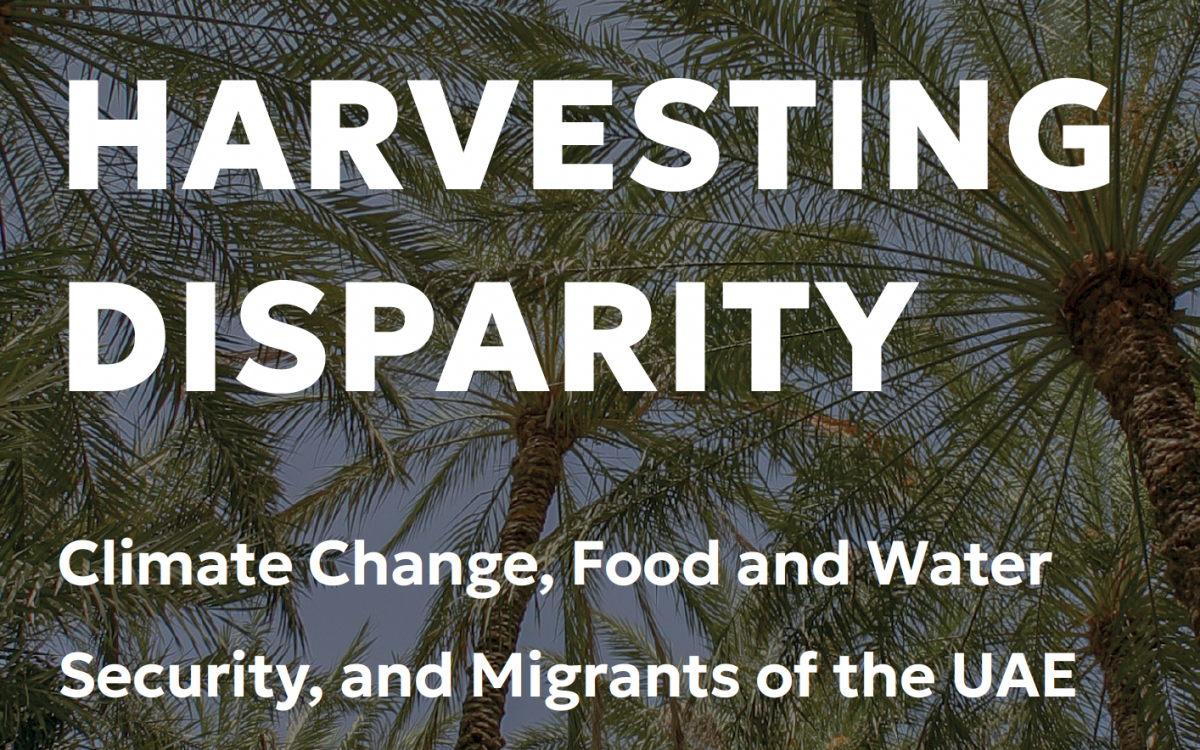New report on COP28’s food and agriculture image and UAE’s migrant workers

The image of climate-friendly menus being pushed at this year’s global climate conference, COP28 in Dubai, UAE, clashes with the stark reality faced by vulnerable communities in the host country, and its impact on the environment, a new report released today unveils.
The official COP28 website proclaims that, “Our focus is to deliver sustainable, affordable, delicious, and nutritious food. COP28 UAE will deliver a catering menu which is largely plant based, emphasizing local and regional produce and promoting environmentally-friendly food consumption.” The site also describes how the COP28 Presidency is “striving to show the world how climate-friendly food can be tasty, healthy and affordable.”
However the team of investigators behind the report – who are based in the Gulf and remaining anonymous to protect their safety – found that outside the venue, the reality for many workers in the UAE was in stark contrast to “environmentally-friendly food consumption”.
The 40-page report, Harvesting Disparity: Climate Change, Food and Water Security, and Migrants of the UAE, explores pronounced disparities in access to quality, nutritious food for migrant workers who grapple with working hours and wage theft that hinder their ability to secure proper meals, while also examining the broader impacts of UAE food supply chain practices on climate and vulnerable communities abroad.
On December 10, the COP28 will dedicate a full day to food and agriculture, marking a historic first for any COP. The host country anticipates that the event will be a “game-changer for food systems”. Just days ago, over 130 countries jointly promised to tackle the impact food and agriculture has on the warming climate for the first time ever.’
The UAE exhibits one of the highest global rates of food waste – per capita waste generation in the UAE is 125% higher than the average in Europe. But despite this, the report found several instances where migrant workers went hungry, unable to get cooked food. One migrant worker is quoted in the report saying, “I spend many days just having one meal a day and eating little bit just to get by.”
Another worker said: “There has been a time when I was not paid for such a long time, and I had sent pretty much most of what I had to my family. I remember looking for coins I might find around my things, misplaced ones, to have enough to buy eggs or something to eat with rice.”
Workers described how they sometimes turned to desperate measures, with one saying: “I basically did not eat for a few days. I just had water and some bread that I ate. It had fungus on it so I cut around it because I had no energy left in me at all and I needed some energy.”
The report also delves into the country’s food security and water scarcity issues, policy interventions, and the broader consequences of these challenges, revealing the limitations of technological innovations aimed at mitigating scarcity issues, and the implications of the large scale offshore agriculture production that the UAE is involved in.
One of the journalists involved in the making of the report said:
“There is considerable buzz and PR suggesting that the UAE has achieved sustainability on every front. However, our findings, as detailed in the report, indicate that this narrative doesn’t align with the reality, particularly concerning food and water. While they portray themselves as forerunners in sustainability, our investigation reveals a different story.”
Besides the dedicated food day at COP28, at least 22 major events during the fortnight of talks will focus on food, agriculture, and water. Additionally, a dedicated Food4Climate pavilion in ExpoCity, the venue for the talks, will emphasize these themes.
The journalist added:
“Despite the greenwashing of the food options served at COP28, this report sheds light on the stark realities underlying the multifaceted challenges in the UAE’s food and water supply—spanning both consumption and production. On one hand, the events and tourism industries, along with many residents in the country, experience excess to the point of creating one of the highest food waste in the world. On the other hand, structural issues leave others deprived.”
A group of Gulf-based journalists, who cannot be named for security reasons, produced the report, leveraging insights from over a dozen interviews with individuals who have lived experiences in the UAE.
James Lynch of FairSquare, which supported the publication and dissemination of the new report, said:
“The importance of this report is not only its well-researched and powerful findings, but also in its authorship. There is a dire need for serious and credible journalism of this kind, that examines – from within the region rather than looking from outside – the UAE’s record on climate, food and water security, and migrant worker rights. Regrettably, the UAE’s repression makes that impossible most of the time.”

